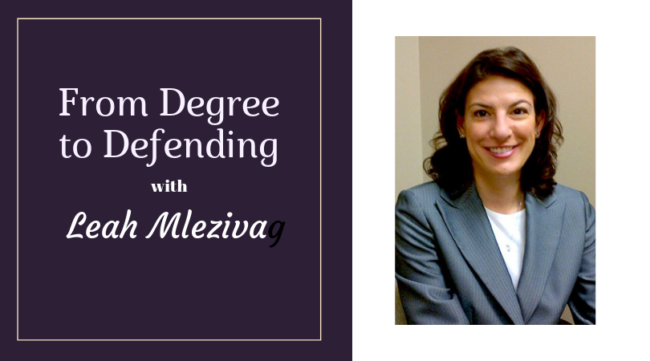Leah Mleziva remembers the first time she knew she wanted to be a lawyer. It was the fall of 1998 at SMU. With only one semester left before graduation, Mleziva found herself sitting in an introductory to law classroom. Contract law, administrative law, business law; the list of classifications went on. For the apathetic few, the subject matter seemed lackluster in comparison to what scripted legal dramas depict.
But then, the professor handed out copies of an article covering an emerging case, titled, “Woman sued for ‘stealing’ sperm.” A man in Albuquerque was suing his ex for getting pregnant without his permission. Though the bizarre title might have been enough to gain an average student’s interest, Mleziva was captivated by more than just the headline.
“When she handed the article out, I was thinking that if I could have a job where I could have that kind of entertainment on a regular basis, then I might be able to like my job,” Mleziva said. “That was kind of the moment where I thought that I should really consider applying to law school.”
Nearly 20 years have passed since then. Needless to say, the reality of life as an attorney is a little different than what you see on Law & Order. Mleziva spent three taxing years at Texas Wesleyan and several uninspiring years at the DA’s office after that. Finally, at 41, Mleziva found her niche as a defense attorney. Most of her time is spent in an office making phone calls, answering emails, collecting information for cases. Oh, and paperwork. Lots of paperwork.
The tediosity does not bother Mleziva, though. In fact, according to longtime friend and colleague Casey Davis, she thrives in it.
“[Leah] has this uncanny ability to obsess over something, but not in a bad way,” Davis said. “She obsesses over small details and doesn’t get bored with the minutia in her cases.”
This willingness to brave the mass of data and information in the chance of stumbling upon some small detail, time stamp, loophole, etc. that might work in favor of her client is apparent even from one glance at her office table.
“Mondays and Tuesdays are usually my days to either be in the office, answer emails, or watch all of these videos,” Mleziva says. Behind her is a table covered with a variety of media, from papers to files to CDs. She gestures to a stack that, from the looks of it, required about half a ream of paper to produce.
As if the heap was lacking in shock value, Mleziva earnestly presents a few CDs and two flash drives.
“I have two flash drives, tapes, DVDs, all for one case: a first-degree felony theft for a 19-year-old kid. This one,” Mleziva says, holding a single flash drive, “has Snapchat videos.”
All of those messages and videos that you think go away? They don’t, and sometimes it’s up to tedious and abundantly patient defense lawyers like Mleziva to go in a dark room and sift through all of them for the sake of her clients.
She does all of this, day in and day out. Not necessarily because it is a fun activity or particularly stimulating research (though, who knows with the occasional archive of Snapchat videos at her disposal), but because it is her job. Mleziva feels a sense of compassion and responsibility to her clients that is surprisingly lacking in many attorneys.
“[Leah] is legitimately interested in making sure justice is done,” Davis said. “Where a lot of defense attorneys would get lazy, she steps up.”
Her father, Jim, noticed this sense of compassion and drive in her as well. In many cases, defendants have no one; no family, no friends. In those instances, Mleziva steps in as both a legal guide and, sometimes, an empathetic listener.
“She chose to leave the DA’s office and see the other side and see where [the accused] are coming from. She gets to see those who didn’t have parents like you and me have,” Jim said.
Mleziva’s cases are not always bound to mitigating small cases. Sometimes her cases challenge her patience, her morals, her sanity, and sometimes all of the above.
“There are some days where I don’t want to be a lawyer,” Mleziva says, her eyes glazing from her computer to her numerous cellphone notifications to the hoard of files just behind her. “But being able to be a person, sometimes the only person, that can show her clients that I care…that’s what makes it all worth it.”





















